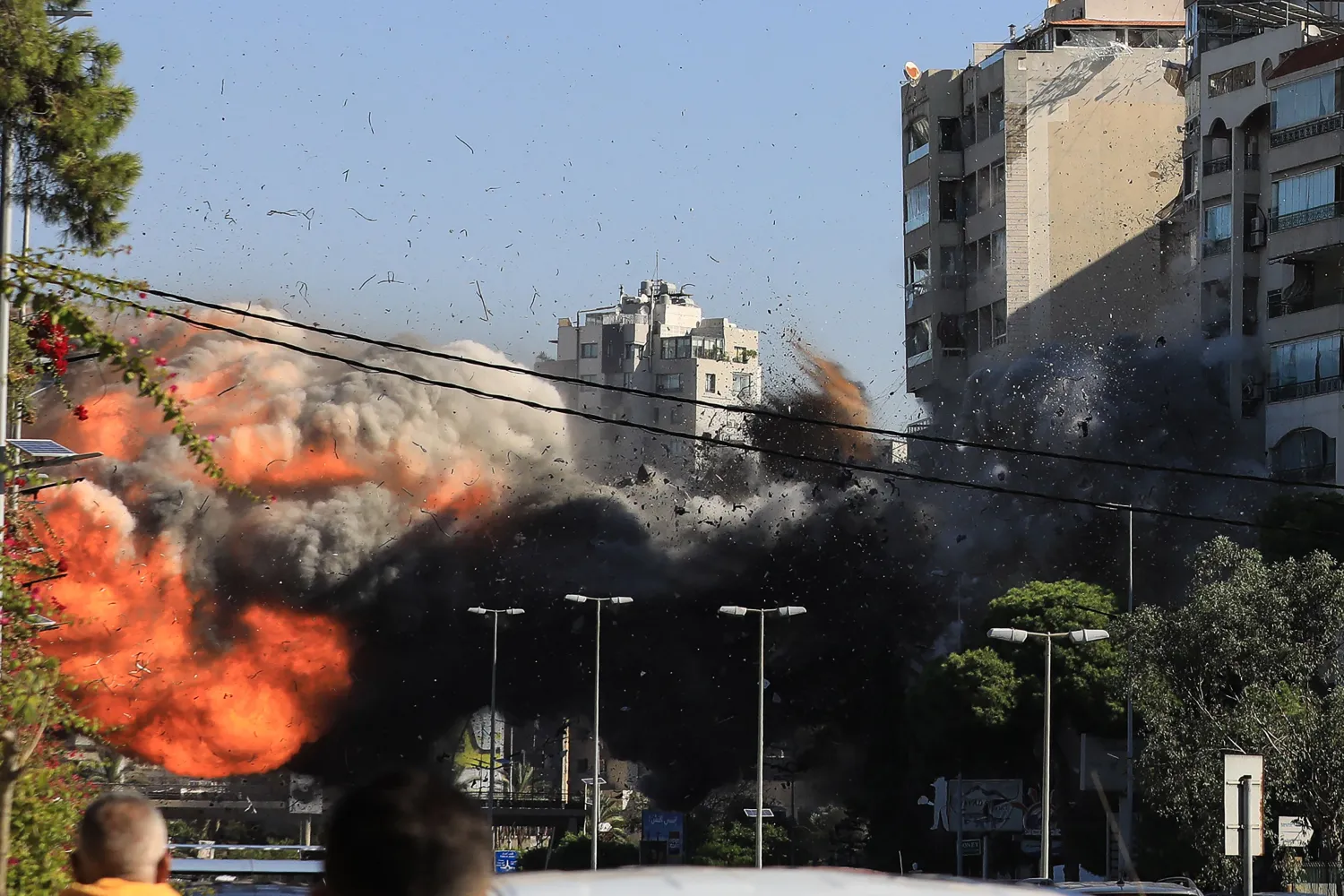An Israeli strike on Friday morning hit a building on the edge of Beirut's southern suburbs, near a central park in the city, witnesses told Reuters.
The strike followed about 50 minutes after an evacuation warning for the area, which is a densely packed neighborhood that includes residential apartment buildings, businesses and a police center.
On Thursday, an Israeli airstrike killed at least 12 Lebanese rescue workers inside a civil defense center in the eastern city of Baalbek, according to health and rescue officials, hours after state media in Syria said Israeli strikes in and around the capital killed at least 15 people.
Lebanese emergency workers were digging through the rubble Thursday evening to search for more of their colleagues still trapped under the destroyed rescue center, the group said in a statement. At least three civil defense members were wounded, The Associated Press said.
There was no immediate comment from the Israeli military. Lebanon’s civil defense forces have no affiliation with the militant group Hezbollah, and they provide crucial rescue and medical services in one of the world’s most war-torn nations.
The Health Ministry condemned what it called a “barbaric attack on a Lebanese state-run health center,” adding that “it is the second Israeli attack on a health emergency facility in less than two hours.”
In southern Lebanon, an Israeli strike on Arabsalim village targeted the Health Authority Association, a civil defense and rescue group linked to Hezbollah, killing six people, including four paramedics, the Health Ministry said.
Earlier, Israel carried out at least two airstrikes on the western Mazzeh neighborhood of Damascus and one of the suburbs of Syria's capital, Qudsaya, killing at least 15 and wounding another 16, Syria's state news agency said. An Associated Press journalist at the scene in Mazzeh said a five-story building was damaged by a missile that hit the basement.
The Israeli military said it hit infrastructure sites and command centers of the Islamic Jihad militant group.
In Syria, an official with Palestinian Islamic Jihad said the strike in Mazzeh targeted one of their offices, and several members were killed. The official spoke on condition of anonymity because he wasn’t authorized to speak to the media.
The airstrikes came shortly before Ali Larijani, an adviser to Iran’s supreme leader Ali Khamenei, was scheduled to meet in Syria's capital with representatives of Palestinian factions at the Iranian Embassy in Mazzeh.
Israel's military says Islamic Jihad participated alongside the Palestinian militant group Hamas in the Oct. 7, 2023 attacks from Gaza into Israel that killed some 1,200 people — mostly civilians — and saw 250 others abducted.
The ensuing Israel-Hamas war has spilled into the wider region, affecting Lebanon, Syria and leading to strikes between Israel and Iran. The war has left much of Gaza in ruins and has killed over 43,000 Palestinians, mostly women and children, according to local health authorities who do not distinguish between civilians and combatants.
Israeli warplanes intensified airstrikes in Lebanon on Thursday, targeting various areas in southern and eastern Lebanon, including the outskirts of the port city of Tyre and the Nabatieh province, the National News Agency said.
Throughout the day, sporadic airstrikes targeted Beirut’s southern suburbs in a clear uptick in attacks on the district over the past two days, with the Israeli military issuing evacuation warnings for several locations and buildings in the suburbs.
The Israeli military said it struck Hezbollah targets in the Dahiyeh area, including weapons storage facilities and command centers. Military spokesman Rear Adm. Daniel Hagari said that over the past week, Israel had “struck more than 300 targets from the air across Lebanon, including about 40 targets in the heart of the Dahiyeh in Beirut.”
Lebanon’s state media said an earlier Israeli airstrike hit a building in Baalbek, killing at least nine people and wounding five others. The strike came without warning. The Israeli military did not immediately comment and the target was unclear.
A report by the World Bank on Thursday estimated that Lebanon has suffered $8.5 billion in physical damages and economic losses from 13 months of war.
Hezbollah began firing into Israel on Oct. 8, 2023, in solidarity with Hamas in Gaza. Since then, Israeli strikes and bombardment in Lebanon have killed at least 3,380 people while the number of wounded has surpassed 14,400, the Health Ministry said Thursday. Among the dead were 658 women and 220 children.
In Israel, 76 people have been killed, including 31 soldiers.
Before the war intensified on Sept. 23, Hezbollah said that it had lost nearly 500 members but the group has stopped releasing statements about their killed fighters since.
United Nations peacekeeping chief Jean-Pierre Lacroix, speaking during a visit to Lebanon, said the UN remains committed to keeping its peacekeeping force, known as UNIFIL, in place in all of its positions in southern Lebanon, despite intense ongoing battles between Israeli forces and Hezbollah militants.
UNIFIL has continued to monitor the escalating conflict between Israel and Hezbollah across the boundary known as the Blue Line despite Israeli calls for peacekeepers to pull back 5 kilometers (3 miles) from the border. UNIFIL has accused Israel of deliberately destroying observation equipment, and 13 peacekeepers have been injured in the fighting.
Israeli Strike Hits Edge of Beirut Suburbs

A ball of fire erupts as an Israeli strike hits a building in Beirut's southern Ghobeiri neighborhood on November 15, 2024, amid the ongoing war between Israel and Hezbollah. (Photo by AFP)

Israeli Strike Hits Edge of Beirut Suburbs

A ball of fire erupts as an Israeli strike hits a building in Beirut's southern Ghobeiri neighborhood on November 15, 2024, amid the ongoing war between Israel and Hezbollah. (Photo by AFP)
لم تشترك بعد
انشئ حساباً خاصاً بك لتحصل على أخبار مخصصة لك ولتتمتع بخاصية حفظ المقالات وتتلقى نشراتنا البريدية المتنوعة







